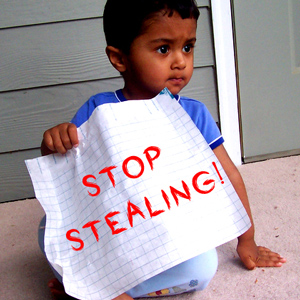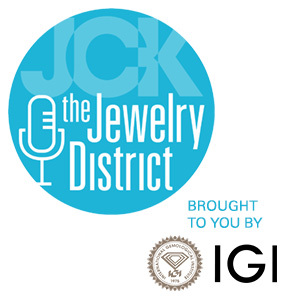
This past March, I wrote a story about the jewelry industry’s pervasive problem with copycats—manufacturers and individuals who brazenly steal ideas from hardworking designers and brands, then pass them off as their own.
It’s an issue that’s plagued the business since there’s been a business. But while to my knowledge there are no statistics on copyright infringement specifically for jewelry, the deluge of rip-offs seems to be intensifying. And it’s on every tier; overseas factories, luxury fashion houses, and even successful indie designers are guilty of stealing designs. I can’t name names, but I’ve seen the jaw-dropping side-by-side photos. There are even a few über-celebrated ateliers who appear to copy designs as a matter of course.
They get away with it for one reason: Battling copycats is timely and expensive. Really expensive. So most designers don’t bother to go to war, or give up on chasing down their copiers after a few years.
Alison Chemla, founder of Alison Lou, said in March, “When I started, [copycats] would get me so upset. But there came a time when I had to put my blinders on and make new pieces and move forward.”
If it’s unrealistic to take on copycats as a single designer, are there ways the industry as a whole could combat them? David Kerr, an intellectual property attorney based in Boulder, Colo., suggests that the industry do its own policing, noting, “If you can get enough movement in the industry of people saying enough is enough, it just might work.”
One of the most obvious ways of doing this might be to copy—a brilliant idea, that is.
The fashion industry has a major watchdog in Diet Prada, the Instagram page that calls out instances of fashion designers and luxury houses copying one another’s work, which they do often, and occasionally down to the stitching.
Founded by fashion insiders Tony Liu and Lindsey Schuyler, Business of Fashion calls it “the most feared Instagram account in fashion.” Too true. Being called out as a copycat on Diet Prada, which has 2.8 million followers, means you should be ashamed, very ashamed. And you might even be cancelled.
It’s been a powerful tool for the fashion industry because no one wants to be cancelled…or shamed. It’s the ultimate deterrent.
Diet Prada occasionally takes on jewelry copycats, but it’s more focused on apparel, the runways, and, increasingly, current events, on which it sometimes takes controversial stances. But there’s just as much design theft in the jewelry world, and no one’s documenting it with any force or continuity.
Until recently, an Instagram feed with the handle @trashmanovich existed that occasionally called out jewelry ripoffs, but it’s since disappeared from the ’gram.
It’s a pity, because an outlet that exposes industry copycats in an unbiased manner could have a definite chilling effect on infringers—particularly brands that have found success by directly copying the work of others (I follow a few such brands on Instagram and am ever-incredulous that they’re able to operate so freely, so dishonestly, and for so long).
If a consortium of small brands co-ran a Diet Prada–like site for the industry, there would be—at the very least—more visibility around the issue of copyright infringement. And that would clearly be a good start.
(Photo: Nisha A.)
Follow Emili Vesilind on Instagram: @emilivesilind
- Subscribe to the JCK News Daily
- Subscribe to the JCK Special Report
- Follow JCK on Instagram: @jckmagazine
- Follow JCK on X: @jckmagazine
- Follow JCK on Facebook: @jckmagazine






